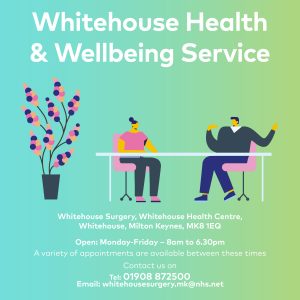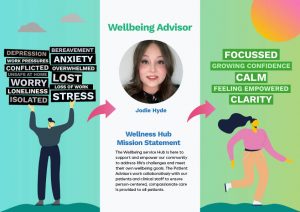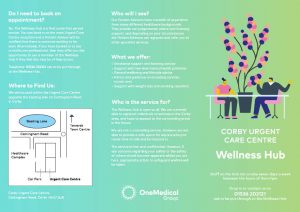As part of April’s Stress Awareness Month, our Wellbeing Advisors across OMG have provided helpful information to their patients and teams to help them with stress management if they’re worried or anxious, from individual support and advice to helpful information displayed in waiting areas.
Rosie Barton, Wellbeing Lead at Whitehouse Surgery, Jodie Hyde, Wellbeing Advisor at St Thomas Road Surgery, and Eleanor Finnerty, Wellbeing Advisor at Corby Urgent Care Centre, share below why managing stress is important, and their tops tips to help de-stress – either at work or home – from being more active to getting creative and making time for relaxing hobbies.
Rosie Barton’s tips:
Work-life balance
Maintaining a work-life balance is so important for our wellbeing. However, particularly for those who work from home, we must put in place boundaries to protect our ‘down time’. For me, this means turning off my work phone and putting my laptop away when my day has finished – it’s tempting to reply to an email if you hear that familiar ‘ping’!
Regular exercise
I find exercise so helpful. I try and walk daily and go for long bike rides at the weekend, weather dependent! If you find making time for exercise challenging, try meeting a friend to walk with or listening to some music while you walk. Exercise can help us unwind after a busy day and being outside in the fresh air is also beneficial, especially if you work from home or in an office with little daylight.
Connecting with people
Connecting with supportive people in my life can turn my day around. Having a safe place to vent and offload is important. I find it helpful to eat my lunch with other colleagues or call a family member on my break.
Making time for our hobbies
After years of pressure from my mum, I’ve recently taken up baking! I like to spend a couple of hours on a Sunday making delicious treats to bring to work on a Monday. Making time to do the things we love can really help us de-stress and boost our mood.
Getting out for the day
Going somewhere new can help re-set and refresh us. I’m not sure what it is about the seaside, but for me there’s something relaxing about sitting on the beach and watching the waves. I try to plan a trip to the seaside every six weeks and this is a big stress-reliever for me, especially if the weather is nice!
Find out more or get in touch with the Wellness Hub team at Whitehouse Surgery here.

Jodie Hyde’s Tips:
Walking in nature
I tend to walk in the countryside or woodlands, which has to be one of my favourites, particularly in the sunshine.
Meditation
I’ve tried meditation, which I found very calming. It isn’t for everyone, but it focuses on breathing techniques and being one with yourself, focusing on your well-being and self-care. The music is also lovely! You can do this one anywhere, which is great for fitting it around other commitments in our lives.
Getting creative
Feel like trying something new? Go for it! Whether it’s baking, drawing, painting or photography, a creative or artistic outlet can help you manage stress.
Reading
Reading can relax your body by lowering your heart rate and can reduce stress levels by up to 68%.
Find out more or get in touch with the Wellness Hub team at St Thomas Road Surgery here.

Eleanor Finnerty’s tips:
Regular breaks
Whilst doing “must do” tasks, try and set yourself regular breaks where you genuinely remove yourself from the source of stress. Close the laptop, turn off the news, and take a step away from a busy event. Take a deep breath, listen to some music, or do whatever you need to do to feel separated for these breaks.
To Do lists
If you like writing to-do lists, remember to include things you want to do on there, not just things you must do.
Listen to your body
Remember to listen to your body and respond to its needs. Your body is a compass that, when listened to, will guide you to what it needs at that moment. When we are stressed, we usually ignore the basics – keeping hydrated, eating nutritious food, and sitting comfortably.
Consider boundaries
Consider boundaries and what place they have in your life – maybe the rejigging of these boundaries could help you feel more in control.
Talk to someone
You haven’t got to work this out all on your own. Talk to a loved one, colleague or friend – or even your GP or Wellness Hub.
Find out more or get in touch with the Wellness Hub team at Corby Urgent Care Centre here.

Stress can lead to serious health problems, such as high blood pressure, heart disease, anxiety, and panic attacks, so reducing stress in our everyday life can make us healthier and happier.








